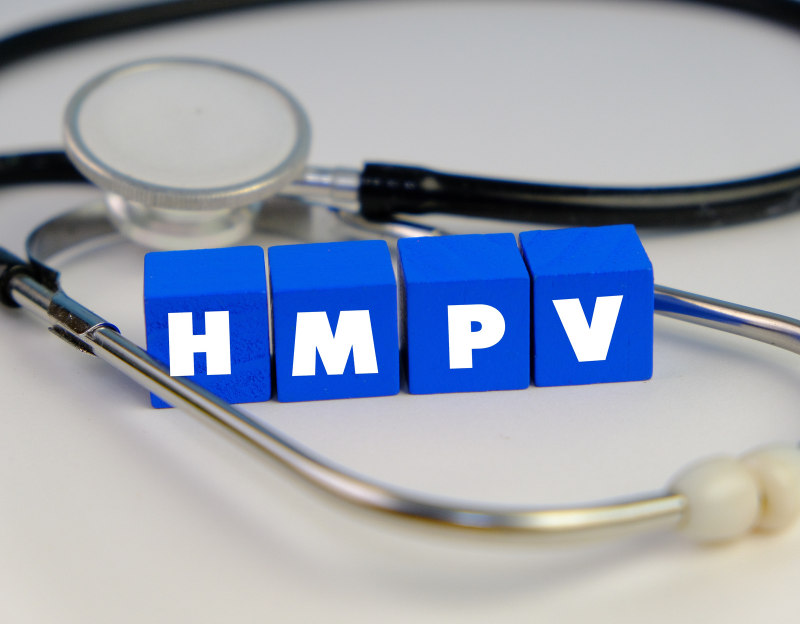
24 Apr, 2025

24 Apr, 2025

This article is medically reviewed by Dr. Maitri Gandhi, Consultant - Radiation Oncology, HCG Aastha Cancer Centre, Ahmedabad.
Human metapneumovirus (HMPV) is a respiratory virus that usually infects the upper and lower respiratory tracts. Isolated for the first time in 2001, it is one of the members of the Paramyxoviridae family (Pneumovirinae subfamily). These viruses are generally closely related to a respiratory syncytial virus (RSV). The virus spreads through respiratory droplets, direct contact with infected individuals, or contaminated surfaces.
HMPV symptoms could vary from mild colds to more severe upper and lower respiratory illnesses in susceptible individuals.
HMPV, though capable of producing cold-like symptoms such as cough, coryza (inflammation of the upper respiratory tract), and low-grade fever, is not to be confused with the common cold.
HMPV infections may lead to severe respiratory illnesses, ranging from bronchiolitis and pneumonia to asthma. Unlike those cold symptoms, which are often due to rhinoviruses, HMPV causes much greater complications.
Human metapneumovirus is a common respiratory virus found in humans.
Research indicates that nearly all people will be exposed to HMPV by age five. Most annual outbreaks of this virus occur during late winter and spring.
Rates of hospitalization are significant in young children and the elderly, as well as in those who are immunocompromised.
HMPV and RSV viruses are closely related viruses that share similar symptoms and methods of transmission.
Both of these can cause serious respiratory diseases, especially in younger children and the elderly. HMPV-infected people tend to be found among a wider age range and in a later period of the respiratory virus season.
The symptoms of human metapneumovirus can vary widely between mild and severe, depending on different factors like age, existing health status, and immunity. Here are some examples of ordinary signs of the HMPV virus:
In some severe cases, bronchiolitis or pneumonia may develop, requiring hospitalization.
Direct transmission is how a human metapneumovirus virus causes infections. When an infected person coughs, sneezes or comes into contact with contaminated surfaces, aerosol droplets are released into the environment. The HMPV virus invades the epithelial cells of the respiratory tract and causes inflammation and respiratory symptoms.
Some populations are disproportionately affected by severe cases of human metapneumovirus (HMPV) infection. These include:
Most cases of HMPV infection typically resolve without complications; however, severe forms may lead to any of the following conditions:
A diagnosis of HMPV is based on clinical symptoms and exposure history. Tests that could be performed are:
Differentiating HMPV from other respiratory viruses like RSV or influenza is critical for accurate management.
At present, there is no established antiviral drug for the human metapneumovirus treatment. The management of the patient usually involves symptom alleviation and supportive therapy to aid recovery.
Preventative methods can considerably reduce an individual's risk of acquiring human metapneumovirus infection. These include:
The majority of HMPV infections are mild and resolve in about 7-10 days. Severe cases, however, may last longer and demand hospitalization or prompt care. Early diagnosis and effective management can improve outcomes and reduce complications.
Recovery time depends on the severity of the infection and also on the general health of the individual. Generally, mild cases clear themselves within about a week, and more serious cases would take weeks to recover, especially if hospitalization is required.
If you have acquired a diagnosis of HMPV, these are some of the steps for self-care that you should consider:
Seek medical assistance immediately, if at all necessary.
People at risk should not delay consultation with a health care provider if they develop any symptom suggestive of HMPV infection.
Human metapneumovirus (HMPV) is a significant respiratory pathogen that can cause severe illness, particularly in vulnerable populations. Learning the HMPV symptoms, human metapneumovirus causes, and prevention measures might lower its impact. In most cases, these infections present themselves with mild symptoms.
Early detection and proper management are essential for handling serious infections. With a good hygiene routine and timely medical advice, you will have the best recovery.

Author Bio : Dr. Maitri Gandhi
Consultant - Radiation Oncology
MBBS, MD
Dr. Maitri Gandhi is an experienced oncologist specializing in radiation therapy. She has undergone efficient training for three years at the Gujarat Cancer & Research Institute and is well-versed in multiple radiotherapy techniques. She is highly knowledgeable about the latest developments in the field of oncology and is an expert in patient care, interpersonal communication, problem-solving, and clinical teaching. In addition to her professional commitments, she is actively involved in cancer awareness campaigns and has participated in numerous national conferences.
To book an appointment with Dr. Maitri Gandhi, please click here.